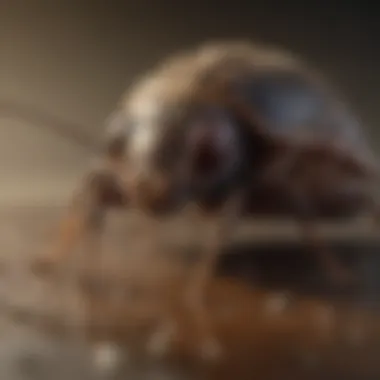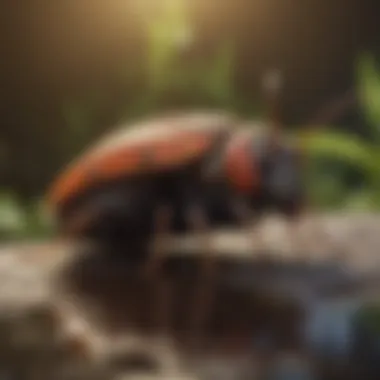Comprehensive Guide to Pest Control in Milton, FL


Intro
Pest control is an essential concern for homeowners in Milton, Florida. Given its unique climate, the region is home to various pests that can result in significant damage to property and personal discomfort. Understanding these pests is the first step in preventing their intrusion. This guide aims to provide practical advice on identifying common pests, effective prevention techniques, and eco-friendly solutions, fostering a pest-free living environment for families.
Identification of Common Pests
Understanding the types of pests prevalent in Milton is crucial for effective management.
Description of Common Pests
In Milton, the most common pests include:
- Termites: These wood-destroying insects often go unnoticed until significant damage occurs.
- Ants: Various species, such as fire ants and carpenter ants, can invade homes.
- Roaches: The American cockroach and German cockroach are the most frequent home invaders, especially in humid environments.
- Mosquitoes: With standing water nearby, these insects become a nuisance during warm months.
- Bed Bugs: Often hitchhikers in luggage, they are now a common issue in Milton.
Signs of Infestation
Each type of pest has its own telltale signs that can alert you to an infestation.
- Termites: Look for mud tubes on exterior walls and hollow-sounding wood.
- Ants: Trails of ants moving indoors or outdoors indicate a nest nearby.
- Roaches: Their droppings, often appearing as small black specks, can be found near food sources.
- Mosquitoes: If you notice an increase in bites or see standing water, it may indicate a breeding area.
- Bed Bugs: Look for small blood stains on sheets or dark spots from excrement.
Prevention Techniques
When it comes to pest control, prevention is more effective than treatment.
Home Maintenance Tips
Proper maintenance of the home is vital. Consider the following:
- Seal cracks in walls and foundations to prevent entry.
- Keep food in airtight containers and clean up spills promptly.
- Regularly inspect basements and attics for potential entry points or signs of pests.
Environmental Modifications
Adjusting your outdoor environment can also help deter pests:
- Ensure gutters are clean and functioning properly to avoid standing water.
- Trim vegetation away from home to reduce harborage areas.
- Relocate firewood away from the foundation of your house.
Eco-Friendly Pest Control Options
Many homeowners today seek solutions that minimize environmental impact while effectively managing pests.
Natural Pesticides
There are several natural pesticides that can be used instead of chemical solutions.
- Diatomaceous Earth: This fine powder can harm insects without affecting larger creatures.
- Neem Oil: Derived from the neem tree, it can disrupt pest life cycles.
- Essential Oils: Oils such as peppermint and tea tree can repel certain pests.
Organic Pest Control Techniques
Organic methods aim to control pest populations without harming the environment:
- Use traps rather than chemical sprays for rodents and insects.
- Encourage beneficial insects, like ladybugs, to manage aphids and other pests.
- Implement companion planting to deter pests naturally.
"Understanding the behavior of pests is the key to effective control and prevention."
This guide intends to inform and equip Milton residents with the necessary knowledge for a pest-free home. By being proactive, individuals can save themselves from potential complications arising from pest infestations.
Foreword to Pest Control in Milton, FL
Pest control is essential for maintaining a healthy home and community. In Milton, Florida, the subtropical climate creates an ideal environment for various pests. From ants to rodents, residents often face numerous pest challenges throughout the year. Understanding the specific pest issues in Milton allows homeowners to adopt effective control measures. This article aims to provide insights into the landscape of pest control in Milton, offering practical solutions tailored to the needs of the residents.
Understanding the Need for Pest Control


Pest control is not merely about removing unwanted creatures; it is about preserving the quality of life in one's living space. Pests can damage property, contaminate food, and even pose health risks. For example, rodents can spread diseases and create unsanitary conditions. Termites can compromise the structural integrity of houses, leading to costly repairs. Furthermore, many pests multiply rapidly, making early intervention crucial. Therefore, a proactive approach is necessary to mitigate pest-related issues before they escalate.
Overview of Pest Issues in Milton
Milton experiences a range of pest problems due to its warm climate and proximity to natural habitats. Common issues include:
- Ants: Many species invade homes in search of food, often leading to large infestations.
- Termites: These wood-destroying pests can cause significant damage to homes, particularly older structures.
- Rodents: Rats and mice are prevalent, thriving in both urban and suburban settings.
- Cockroaches: Known for their resilience, these insects can be challenging to eliminate.
- Bed Bugs: These pests are notorious for infesting homes and causing discomfort to residents.
Understanding these issues provides a foundation for effective pest management strategies, making it critical for homeowners to stay informed and vigilant.
Common Household Pests in Milton
Understanding the array of common household pests in Milton is crucial for residents aiming to maintain a pest-free environment. Pests can cause considerable damage to homes and pose health risks to their occupants. The climate and local ecology in Milton create a conducive environment for various pests. Identifying these pests and understanding their habits and risks can help in implementing effective control measures.
Ants
Ants are ubiquitous in Milton, often invading homes in search of food. They can be seen trailing along countertops or floors. While they are not typically dangerous, their presence can indicate sanitation issues and can lead to larger infestations. There are many species, such as fire ants and carpenter ants, each with its own behavior.
To control ants, homeowners can begin by eliminating food sources. Keeping kitchens clean is essential. Simple strategies include sealing food containers and cleaning spills promptly. If infestations persist, baits specifically designed for the type of ants present can be effective.
Termites
Termites are one of the most destructive pests in Milton, capable of causing severe structural damage to homes. They feed on wood and can remain hidden for long periods, making early detection challenging. The most common types in the area include the eastern subterranean termite.
Regular inspections are paramount in preventing termite damage. Homeowners should look for signs of infestation, such as mud tubes or discarded wings. Appropriate action may involve using liquid treatments or bait systems. It is advisable to consult with professionals for severe infestations to ensure effective eradication.
Rodents
Rodents, particularly rats and mice, are a significant concern in residential areas. They can introduce diseases and compromise food safety. Additionally, they are known for gnawing through insulation and wiring, potentially creating fire hazards.
Effective rodent control begins with exclusion. Homeowners should seal cracks, gaps, and openings that could serve as entry points. Regular monitoring with traps can also help in managing populations, while maintaining a clean environment reduces appeal. Pest control professionals might be necessary for larger infestations to utilize more robust removal strategies.
Cockroaches
Cockroaches are notorious for their resilience and adaptability. In Milton, they commonly infest kitchens and bathrooms, thriving in warm and humid conditions. German and American cockroaches are the most frequently encountered varieties.
Preventing cockroach infestations involves proper sanitation and moisture control. Fixing leaking pipes, sealing cracks, and ensuring food is stored correctly are essential steps. When an infestation occurs, a combination of baits, traps, and insecticide sprays may be needed to effectively eliminate their presence.
Bed Bugs
Bed bugs have resurfaced as a pressing issue in households. These pests can hitch rides on luggage and clothing and often infest mattresses and bedding. Bed bug bites can lead to discomfort and insomnia. Despite their small size, they are notoriously difficult to eradicate.
Detection of bed bugs requires vigilance. Homeowners should inspect their sleeping areas regularly, looking for signs like bites or small blood stains on sheets. Professional pest control is often the best approach, as they can employ specialized treatments such as heat treatments or insecticides that are more effective than DIY methods.
"Recognizing the most common household pests is the first step toward effective pest control. Addressing these issues early can prevent larger problems down the line."
Identifying Pest Problems
Identifying pest problems is crucial for effective pest control. It helps in recognizing the type of pests invading your space, the severity of the infestation, and the most suitable methods of dealing with the issue. Many homeowners tend to overlook initial signs of pest presence. This oversight often leads to significant problems later on, including structural damage to the home or health risks from pest-related diseases. By understanding how to identify these issues early, homeowners can take proactive measures to eliminate pests before they become a more considerable headache.
Signs of Infestation
Detecting infestations can require a keen eye for specifics. Common signs include droppings, unusual sounds, or visible pest trails. For instance:
- Droppings: Rodent droppings are often small, dark, and can be found in hidden corners, under sinks, or along walls.
- Chewed Materials: Look for signs of chewing on food packaging, wires, or furniture. This is particularly common with rodents and certain insects like termites.
- Unusual Noises: A scratching sound in the walls may suggest the presence of rodents or other pests.
- Settled Dirt or Dust: Pests like cockroaches leave trails of smeared excrement or dust around their movements that can appear under sinks or in corners.
In addition to these visible signs, one should also pay close attention to a sudden spike in pest activity. For example, you may notice an increasing number of ants leading up to food sources or an uptick in cockroaches during warm months.
Identifying pest problems early can save thousands in potential damage and extermination services.
Documentation and Inspection Techniques


Precise documentation is vital when dealing with pest problems. Keeping a log of sightings and actions taken allows homeowners to track the situation more effectively. Here are some inspection techniques to consider:
- Visual Inspections: Frequent checks of common problem areas such as kitchens, bathrooms, and basements to identify signs of pests.
- Sticky Traps: Place traps in strategic locations. These are effective for both catching pests and identifying the types of infestation.
- Monitoring Tools: Use tools like moisture meters in vulnerable areas to detect conditions conducive to pest infestation, especially for termites which thrive in moist environments.
- Check for Entry Points: Regularly inspect areas where pipes enter the home or near windows and doors. Sealing gaps can prevent future infestations.
Regular documentation combined with thorough inspections significantly aids in both immediate pest control solutions and long-term prevention strategies. This proactive approach not only addresses existing problems but also sets the groundwork for maintaining a pest-free home.
Prevention and Proactive Measures
Preventing pest infestations is an essential part of maintaining a safe and healthy living environment. In Milton, Florida, the subtropical climate provides a perfect habitat for various pests. Thus, understanding and implementing proactive measures equips homeowners with the tools necessary to avoid such nuisances before they escalate into significant problems.
By focusing on prevention, households can not only save on costly treatments but also ensure peace of mind. Maintaining a pest-free home involves consistent actions and vigilance that go beyond just dealing with pests once they appear.
Sealing Entry Points
One of the most effective ways to prevent pests from entering a home is to seal potential entry points. Homes often have small gaps or cracks that go unnoticed. Key areas to examine include:
- Doors and windows: Check for gaps around frames and install weather stripping.
- Vents and utilities: Ensure that gaps around pipes or electrical lines entering the house are properly sealed.
- Foundation: Look for cracks in the foundation or walls and repair them to eliminate easy access for pests.
Sealing entry points is not just a one-time task. Regular audits of the house’s exterior can help identify new vulnerabilities as they develop, maintaining an ongoing defense mechanism against pests.
Regular Maintenance Practices
Consistent maintenance plays a pivotal role in pest prevention. Establishing a routine can minimize the chances of infestations drastically. Important practices include:
- Cleaning: Regularly clean kitchens and dining areas to eliminate food particles that attract pests. Pay special attention to corners and under appliances.
- Decluttering: Reduce clutter around the home, which can provide hiding spots for pests. This includes attics, basements, and garages.
- Proper Waste Management: Ensure trash is sealed properly and disposed of regularly. Keep outdoor waste bins clean and away from the home's exterior.
These practices create an inhospitable environment for pests, ensuring that homes remain tidy and safe.
Landscape Management Strategies
The exterior landscape management significantly impacts pest control. By implementing thoughtful landscaping, homeowners can deter pests before they reach the house. Key strategies include:
- Plant Selection: Choose plants that are less appealing to pests or have natural repelling properties. Native plants often fare better in local climates and may resist pests more effectively.
- Mulch Management: Use mulch sparingly and keep it away from the foundation of the home. Wood chip mulch can attract termites and other pests.
- Water Management: Ensure that there are no standing water bodies in the yard which can attract mosquitoes. Proper drainage should be a priority.
"An ounce of prevention is worth a pound of cure." - Benjamin Franklin
By integrating these prevention and proactive measures into everyday life, homeowners in Milton can effectively reduce the risk of pest infestations, leading to a healthier indoor environment.
Eco-Friendly Pest Control Options
The increasing awareness of environmental sustainability has led many homeowners in Milton to seek eco-friendly pest control options. These methods aim to reduce the reliance on chemical pesticides which can harm beneficial insects, pets, and even humans. Emphasizing natural solutions contributes to a healthier living space and promotes a more sustainable environment. Homeowners should consider the long-term benefits of adopting eco-friendly pest control strategies, including enhanced safety and effectiveness in managing pest populations.
Natural Repellents
Natural repellents are a cornerstone of eco-friendly pest control. Common ingredients such as essential oils, vinegar, and garlic can deter pests without the use of synthetic chemicals. For instance, peppermint oil is often utilized to repel ants and spiders. Mixing a few drops of this oil with water in a spray bottle provides a non-toxic solution for application around entry points in the home. Another example is diatomaceous earth, a powder that is made from fossilized algae and is harmful to many pests yet safe for humans and pets. It works by damaging the exoskeletons of insects, leading to dehydration and ultimately death.
In terms of application, it is vital to ensure that these natural repellents are used regularly. Pests can adapt to the presence of repellents over time, so altering the mixtures or incorporating various methods may be necessary to maintain effectiveness.
"Natural solutions not only provide safety but promote a healthy environment for your family."
Biological Control Methods
Biological control involves using natural predators or parasites to manage pest populations. This can be a highly effective and sustainable way to deal with pest issues. For example, ladybugs are often introduced to gardens to control aphid populations, while nematodes can be deployed to target soil-dwelling pests like grubs.
Implementing biological control methods requires research to identify the right organisms for the specific pests present in Milton. It is also critical to monitor the ecosystem, as introducing non-native species can have unforeseen consequences. Understanding the life cycles and habitats of both pests and their natural enemies allows homeowners to create balanced settings that naturally mitigate pest issues.
Professional Pest Control Services
Understanding the significance of professional pest control services is crucial for maintaining a pest-free environment in Milton, Florida. While DIY methods have their place, there are scenarios where expertise truly matters. Professionals bring specialized knowledge, tools, and techniques tailored to different pest problems. They can assess situations accurately and provide solutions that are both effective and safe.
Benefits of Professional Services
Professional pest control services offer numerous advantages. First, trained personnel can identify pest species that may not be obvious to untrained eyes. This is essential for implementing effective extermination methods. Second, professionals utilize industry-grade products and equipment, ensuring results that go beyond what store-bought solutions can achieve. This can lead to long-term solutions rather than temporary fixes. Third, these services often include follow-up visits to monitor and ensure that the infestation does not return, offering peace of mind to homeowners.


Considerations on Hiring Professional Services
It is important to carefully select pest control services. Some factors to consider include the company's reputation, the extent of their experience with specific pests, and the methods they employ for pest management. Additionally, understanding their approach to environmentally friendly practices might align better with your values and your concerns for sustainable living.
In summary, hiring a professional pest control service can save time, provide better solutions, and offer a degree of safety that DIY methods may not guarantee. For complex and persistent infestations, the expertise provided by trained technicians is unparalleled.
When to Seek Professional Help
Identifying the precise moment when to engage professional help can be as important as the treatment itself. Here are some signs that indicate it might be time to call in an expert:
- Persistent Infestation: When pests continue to return despite your attempts to manage them, it's a clear sign that professional intervention is needed.
- Health Risks: Certain pests, such as rodents and cockroaches, can pose significant health risks. If you're concerned about diseases or allergies related to these pests, professional help is essential.
- Property Damage: Infestations like termites can lead to severe damage to your home. If you notice signs of damage, it's best to consult with professionals right away.
Choosing the Right Pest Control Company
Selecting an appropriate pest control company involves careful consideration. Here are several key points to guide your decision-making process:
- Research: Look for companies with positive reviews and ratings. Online platforms such as Reddit can provide insights from local residents about their experiences.
- Certifications: Ensure the company has proper licenses and certifications relevant to pest control in Florida. This often indicates adherence to safety and efficacy standards.
- Services Offered: Investigate whether the company provides a comprehensive range of services. A company that specializes in various types of pests can be more beneficial in managing different issues as they arise.
- Eco-Friendly Practices: If environmental impact is a concern for you, inquire about the company's methods for pest control. Some companies focus on using eco-friendly products and techniques, which can be beneficial for households with children and pets.
In closing, asking the right questions and doing thorough research will greatly enhance your ability to choose the right pest control company. Professionals can make a significant difference in maintaining a pest-free home.
Costs Associated with Pest Control
Understanding the costs associated with pest control is essential for homeowners looking to maintain a pest-free living environment. The expenses can vary widely based on several factors, including the type of pest, the scale of the infestation, and the chosen treatment method. By recognizing these costs, individuals can make informed decisions that align with their budgets and pest management needs.
Factors Affecting Pest Control Pricing
There are multiple factors that contribute to the overall pricing of pest control services. Some of these include:
- Type of Pest: The specific pest in question often dictates the treatment required. For example, termites may necessitate more invasive and costly treatments than ants or spiders.
- Severity of Infestation: A minor infestation may require a quick and inexpensive fix, while a more severe issue could involve extensive services and higher costs.
- Treatment Method: Different techniques come with varying price tags. For instance, eco-friendly treatments might be pricier upfront but can be worth the investment for health-conscious homeowners.
- Property Size: Larger homes typically require more extensive treatments compared to smaller spaces, influencing the pricing.
- Frequency of Treatment: Some households may benefit from regular maintenance visits, which can alter the pricing model compared to one-time treatments.
Knowing these factors enables homeowners to prepare financially for pest management.
Budgeting for Pest Management
Budgeting for pest control is a crucial step in managing household expenses. There are several approaches that can help streamline this process:
- Research Costs: Start by investigating average pest control costs in Milton, FL. This can provide a baseline for understanding what services may cost.
- Obtain Quotes: Reach out to local pest control companies for quotes. Ensure to request written estimates that detail what the service includes.
- Consider Long-term Solutions: Investing in preventative measures, such as sealing entry points and maintaining cleanliness, may save costs in the long run by reducing the likelihood of future infestations.
- Set Aside an Emergency Fund: Allocate a budget specifically for pest control. This can ease the financial burden when unplanned infestations occur.
- Review Insurances: Some home insurance policies may cover certain pest control costs. Checking your coverage can be beneficial.
"Understanding the costs and setting a budget for pest control can help avoid unexpected expenses and ensure a pest-free home."
In summary, recognizing and budgeting for pest control costs is vital. A well-informed approach can not only assist in maintaining a pest-free environment but also foster financial management. Efficient budgeting and understanding the factors influencing pricing empower homeowners to make educated decisions.
The End and Best Practices
In this final section, it is crucial to recognize the significance of implementing effective pest control strategies in Milton, Florida. The area is particularly susceptible to various pests, and understanding the best practices can greatly enhance the efficiency of pest management efforts. Practicing these recommended measures ensures a homeowner's investment in a pest-free living environment is protected.
Key elements to consider include:
- Regular inspections
- Immediate action on signs of infestation
- Ongoing education on pest behavior
- Utilization of both preventive and responsive strategies
These practices foster a proactive approach, reducing the likelihood of larger infestations that are harder to control. Homeowners should make it a habit to check their homes for vulnerable areas and address any issues promptly. The benefits are multifold; not only does it save money in the long run, but it also contributes to the health and comfort of the occupants.
Summary of Key Points
In summary, managing pest control effectively in Milton involves several essential takeaways:
- Identifying Pests - Knowing which pests are common in Milton allows for targeted solutions.
- Prevention is Key - Implementing preventive measures minimizes pest encounters.
- Education - Understanding pest behavior is crucial for effective control.
- Seek Expertise - Professional pest control services bring in-depth knowledge and resources.
- Cost Awareness - Being informed about pricing allows for better budgeting.
These points help solidify a homeowner’s understanding and capability in handling pest-related issues effectively. By embedding these practices into routine home maintenance, residents can achieve a stable and pest-free living space.
Continuing Education in Pest Control
Ongoing education in pest control is vital for keeping up with emerging trends and methods. Homeowners, renters, and even pest control professionals can benefit from resources that update them on:
- New Pests - Awareness of any new pests in the region is essential.
- Innovative Control Techniques - Learning about advancements in eco-friendly solutions.
- Legal Regulations - Understanding the regulations that govern pest control practices.
Resources like local workshops, online forums, and reputable sites such as Wikipedia, and Britannica offer valuable information. Utilizing knowledge from these platforms not only enhances a homeowner’s ability to manage pests but also promotes a greater commitment to sustainable practices.
Investing time in continuing education will empower residents of Milton to adapt their pest control strategies effectively, ensuring their homes remain safe and comfortable.







